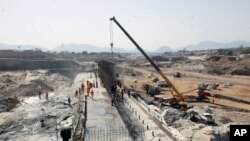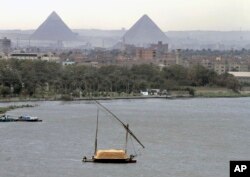ADDIS ABABA —
Ethiopia says there is no reason for Egypt to worry about the massive hydroelectric dam it is building on the Blue Nile, one of the two main tributaries of the Nile River. Ethiopia began diverting the Blue Nile last week as it moves ahead with construction of the dam, despite concerns from Egypt and Sudan.
Ethiopia’s Water Minister Alemayehu Tegenu says construction of the Grand Ethiopian Renaissance Dam poses no threat to Egypt or Sudan, two countries that depend heavily on the Nile for their water supply.
“We do not have any plan to harm downstream countries, Sudan and Egypt. If Egypt has some issues to discuss with Ethiopia, we are very ready to discuss," said Alemayehu Tegenu.
There are fears the dam could spark regional tension. Ethiopia's move to divert the Blue Nile sparked protests last week at the Ethiopian embassy in Cairo. Some Egyptians have asked to bring the matter to the International Court of Justice for arbitration.
Both countries must accept arbitration before it can take place, but Alemayehu says Ethiopia will not accept such intervention.
“No, there is no point of going to an international court. I do not see any issues that bring the issue to that level," he said.
A committee with experts from Sudan, Egypt and Ethiopia worked on a report for more than a year to study the possible impacts of the dam, including reduced river flow.
The report, released to governments on Friday night, concluded that construction of the dam is meeting international standards, but that further assessments are needed on environmental and social issues.
Ethiopia began diverting the Nile last Tuesday, three days before the release of the panel’s report. Water Minister Alemayehu says those two things are not related.
“We have done the river diversion as per the schedule we have set earlier," he said. "River diversion does not to stop the flow of water to the downstream countries. River diversion means it is the rerouting of the river flow to facilitate the construction in the riverbed, nothing else.”
Ethiopia began building the Grand Ethiopian Renaissance Dam two years ago, near to the Sudanese border, with the goal of becoming Africa’s main power producer. The estimated construction cost of the dam will be close to $5 billion.
More than 85 percent of the Blue Nile originates in Ethiopia, but Sudan and Egypt were given the lion's share of the water in colonial-era treaties many decades ago.
About 20 percent of the dam has been constructed. The project is not scheduled for completion until 2017, but Ethiopia hopes to start producing power as early as next year.
Ethiopia’s Water Minister Alemayehu Tegenu says construction of the Grand Ethiopian Renaissance Dam poses no threat to Egypt or Sudan, two countries that depend heavily on the Nile for their water supply.
“We do not have any plan to harm downstream countries, Sudan and Egypt. If Egypt has some issues to discuss with Ethiopia, we are very ready to discuss," said Alemayehu Tegenu.
There are fears the dam could spark regional tension. Ethiopia's move to divert the Blue Nile sparked protests last week at the Ethiopian embassy in Cairo. Some Egyptians have asked to bring the matter to the International Court of Justice for arbitration.
Both countries must accept arbitration before it can take place, but Alemayehu says Ethiopia will not accept such intervention.
“No, there is no point of going to an international court. I do not see any issues that bring the issue to that level," he said.
A committee with experts from Sudan, Egypt and Ethiopia worked on a report for more than a year to study the possible impacts of the dam, including reduced river flow.
The report, released to governments on Friday night, concluded that construction of the dam is meeting international standards, but that further assessments are needed on environmental and social issues.
Ethiopia began diverting the Nile last Tuesday, three days before the release of the panel’s report. Water Minister Alemayehu says those two things are not related.
“We have done the river diversion as per the schedule we have set earlier," he said. "River diversion does not to stop the flow of water to the downstream countries. River diversion means it is the rerouting of the river flow to facilitate the construction in the riverbed, nothing else.”
Ethiopia began building the Grand Ethiopian Renaissance Dam two years ago, near to the Sudanese border, with the goal of becoming Africa’s main power producer. The estimated construction cost of the dam will be close to $5 billion.
More than 85 percent of the Blue Nile originates in Ethiopia, but Sudan and Egypt were given the lion's share of the water in colonial-era treaties many decades ago.
About 20 percent of the dam has been constructed. The project is not scheduled for completion until 2017, but Ethiopia hopes to start producing power as early as next year.





